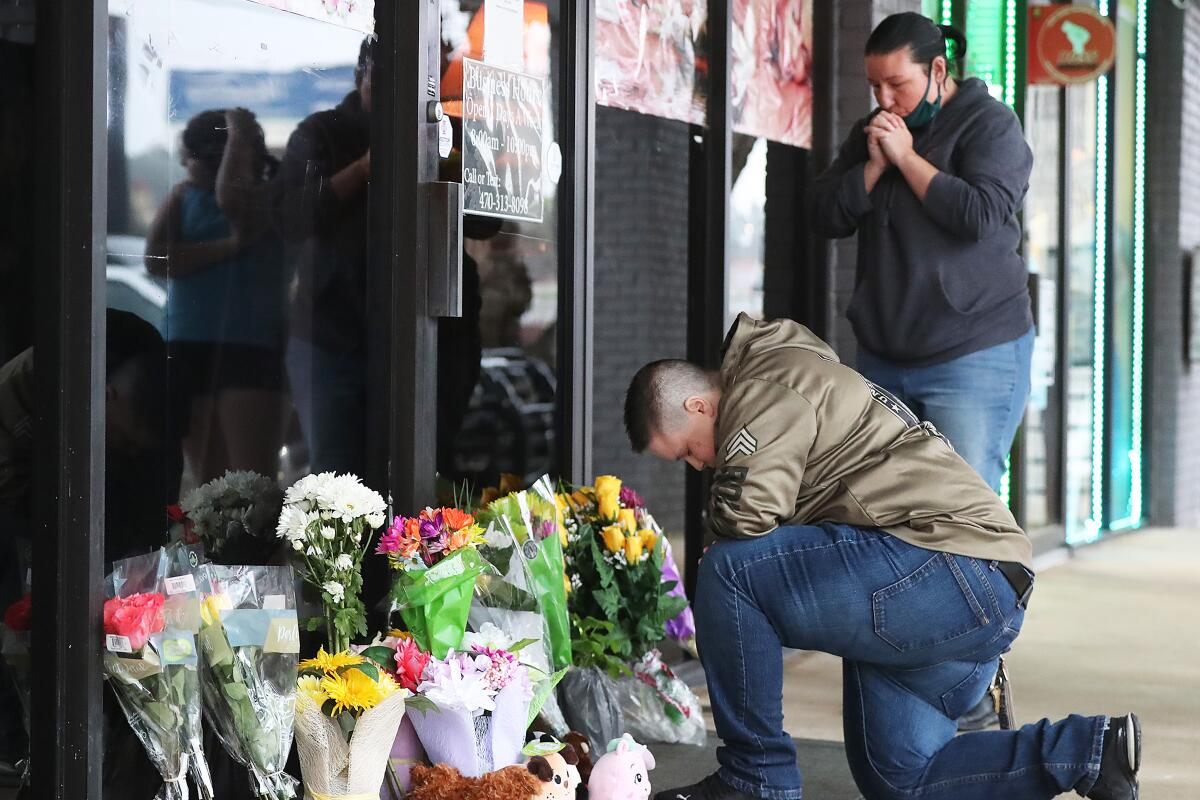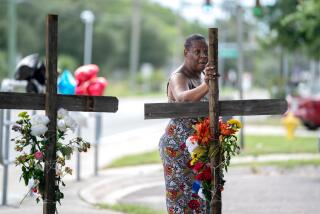Tracy Quan: Don’t forget — the Georgia shootings are a hate crime against sex workers
Eight people were killed in Atlanta last Tuesday. We have no shortage of explanations, including the suspect’s version, which many refuse to accept. Eros, rebranded and vilified as sex addiction, inspired a homicidal atrocity. Is that just a beard for anti-Asian violence?
Untangling the suspect’s motive isn’t easy when race and sex are competing to dominate the narrative. Six of the dead are women of Asian descent, yet the suspect told police he wasn’t motivated by racial bigotry.
Did the suspect visit Asian spas because he had some kind of hang-up about Asians, or is America more Asian than we realize? Surely our presence in every aspect of American life increases the likelihood that people from all backgrounds now interact with Asian America on a regular basis. His visits to Asian-run spas might be unremarkable had he been less violent or less white. In the U.S., interactions and relationships involving Asian women and non-Asian men sometimes attract prurient attention. It’s happening as we speak, inspiring clickbait, eye rolls, perhaps even a cottage industry of analysis and accusation. One accusation making the rounds is that the suspect, 21 years old and white, is in denial about race. I think this misses the point.
His goal was primarily sexual, not racial purity. According to law enforcement and a former roommate, he spoke of porn and the end of temptation. His language, apocalyptic yet banal, sets a familiar tone.
Novelist Steph Cha writes that the face of anti-Asian violence has always been white. It’s the face of a system that devalues and scapegoats Asians.
Despite my Asian background, I find his disavowal of racism strangely credible. Like a lot of people, I’ve experienced bias and ethnic profiling, but I’ve also been a sex worker, and I have encountered more prejudice, more name-calling, more fear, anger and hostility in connection with my sex work than regarding my race. And because I’m a writer too, the author of novels about a call girl, there’s the hate mail. The most memorable outbursts have been odd letters of denunciation from Asian American readers exposing the underbelly of identity politics.

White supremacy is lately defined as America’s “original sin” — a confusing term that recalls St. Augustine reading Genesis so we won’t have to. Original sin has traditionally reeked of sexual knowledge and desire. Now it’s been laicized and racialized — a moral stain that blots out all others.
Asian identity is not well defined in a country where race has been understood as Black or white, but after a wave of attacks against Asians provoked by the pandemic and the former president, it has become a unifying force both within and outside the community. Atlanta’s Black mayor, a white president and a multiethnic vice president with a South Asian name have tried to unite us in the face of another incomprehensible mass shooting by focusing on the increase in these bias crimes over the past year. Flags have been lowered to half-staff.
There are conventions and common manners for dealing with racial violence, and sometimes they transcend party lines. For most public figures, there’s a sanitizing playbook on race, bloodshed and gun violence. The impact of sexual distress is harder to discuss — and not only because of puritanism. Sexuality is surprising, unpredictable; part of being an adult is pretending to have sex figured out. There is sometimes more shame in sex than in race.
Race is public and sex private, but the Atlanta shootings have upended this arrangement. Racialized feelings are beginning to look like more of a taboo than sexual obsessions. The killing of an Asian American is described as a hate crime, while killing a sex worker is seen as a mental health issue. The scarlet R demotes Nathaniel Hawthorne’s scarlet letter A to a venial sin, now standing for (masculine) addiction rather than (female) adultery. Racism is stigmatized, while sex is pathologized. This new chapter in American life requires a closer reading.
The author of “Gold Diggers,” a novel set in Atlanta’s South Asian community, mourns the security she once felt among strip malls that are now crime scenes.
“Sex addiction” is seen by many as empty psychobabble, a daft metaphor at best, dangerously weaponized on “a really bad day.” The rehab center the suspect attended offers “clinically effective and Christ-centered” treatment for this nebulous condition, in essence a medicalization of Christian morality. To me, the doctrine of sex addiction is the erotic equivalent of race science. And yet the killer’s belief is probably sincere: News accounts portray his spa visits as an addict’s relapse, as if sexual contact were a liver-destroying chemical. He may have been confused by appetites that are normal in 21-year-old males.
Robert Aaron Long has something in common with serial killer Ted Bundy (who blamed his own violence on pornography), and his religious faith shouldn’t be ignored. He brings to mind Peter Sutcliffe, known as the Yorkshire Ripper, who thought murdering sex workers was doing God’s will. We should take the disavowal of racial motives more seriously and reconsider our own assumptions.
Mainstream Americans, including many Asian Americans, are quick to blame racism yet unready to discuss an older hatred — what my French friends call “la putophobie” (a term more pleasing to the eye than the clunky compound “whorephobia”). It’s the last acceptable form of hate speech, someone once told me, and persists within minority communities where being a good immigrant is conflated with sexual virtue. Speculation about the spas where the massacre occurred is fed by prejudice. Amplified by so-called antitrafficking voices, this prejudice is dangerously toxic.
Fueled by religious fanaticism and illiberal forms of feminism, by punitive laws and tabloid headlines, this bias breeds self-loathing in young men who should be learning how to nurture, not extinguish, the varieties of human connection. Will the U.S. flag, flying at half-staff for our Atlanta dead, make a difference? I hope so.
For many Asian Americans, the killings further fueled fears about anti-Asian hatred that has mounted over the last year as police and advocacy groups have reported record numbers of hate crimes and harassment.
Quan, author of three novels including “Diary of a Manhattan Call Girl,” is a regular guest on RTHK Radio 3 in Hong Kong.
More to Read
Sign up for our Book Club newsletter
Get the latest news, events and more from the Los Angeles Times Book Club, and help us get L.A. reading and talking.
You may occasionally receive promotional content from the Los Angeles Times.







